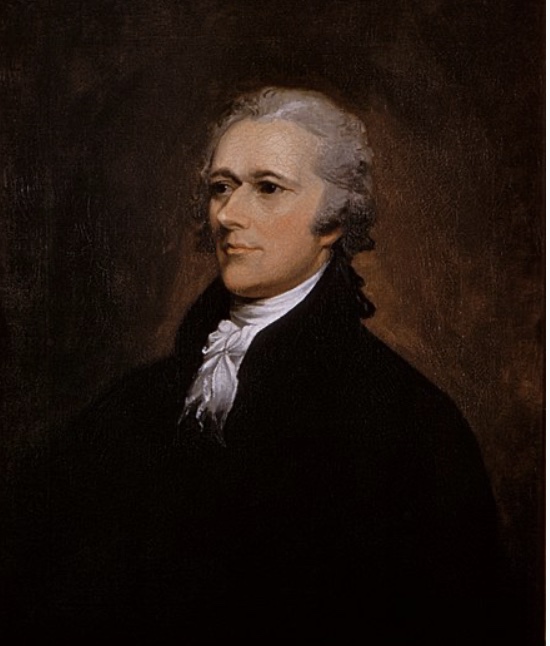
Alexander Hamilton was born on January 11, 1755 in Charleston, the capital of Nevis, now part of St. Kitts and Nevis in the Caribbean. When Alexander was very young, his father deserted the family, so Alexander’s mother, Rachel, took Alexander and his older brother James Jr. to live with her in St. Croix. In 1768, Rachel contracted yellow fever and died, orphaning her two sons. Fortunately, their cousin, Peter Lytton invited the boys to live with him, but within a year, Lytton committed suicide and the boys went their separate ways.
Thomas Stevens, a merchant from Nevis, housed Alexander and trained him as a trader. By 1771, the 16-year-old youth had become so competent, that the owner, on departing for a 5-year voyage at sea, put Alexander in charge of the company’s affairs. From his early years, Alexander had been an avid reader, immersing himself in books from the family library and simultaneously honing his writing skills. In 1772, he wrote a letter to his father describing a devastating hurricane that swept through Christiansted, and attributing its fierce destruction to God’s wrath for the pomposity and sinful behaviour of the community. The publication of this letter in a local religious newspaper brought attention to Hamilton’s remarkable writing skills, prompting the local officials to fund Hamilton’s education in the American colonies.
In May 1774, Hamilton enrolled at King’s College in New York City, and within a few months, he and five other undergraduate students had formed a society that would eventually grow into the Philolexian Society. Supporting the cause of the colonists against the British domination, Hamilton wrote inspiring articles and gave speeches that rallied support for the revolutionary cause. As momentum for a separation from Britain began to foment, the British closed King’s College, and Hamilton was forced to terminate his education without graduating.
After the outbreak of the Revolutionary War in 1775, Hamilton joined a local militia where his performance brought him into leadership positions from which he led patriots into a series of victorious battles. His reputation eventually reached George Washington who invited him to serve as his aide, with the rank of lieutenant colonel. Alexander served in this role for four years, writing letters for Washington and serving as liaison between Washington and other dignitaries. Near the end of this period, he continued to press Washington for a field command. Although initially refusing these requests, Washington eventually relented and appointed him commander of a battalion of light infantry companies. In this role, Hamilton led the assault in the battle of Yorktown, defeating the major part of the British army and signalling an imminent end to the Revolutionary War.
In March 1782, Hamilton resigned his commission and returned to civilian life. Within the next few months, he passed the bar exams to become a lawyer and by July was appointed to the Congress of the Confederation. In the years that followed, Hamilton fought to strengthen Congress so that it would have the power to tax and use these revenues to fund government initiatives and support a military. Hamilton, together with John Jay and James Madison, wrote a series of 85 essays known as The Federalist Papers, to support the proposed U. S. Constitution. These documents, published on October 27, 1787, laid the foundation for the structure and assigned powers of the three components of the U.S. government.
Between 1789 and 1795, Hamilton, in the role of Secretary of the Treasury, used his extensive reading of Adam Smith and others to lay the foundations for US currency, the handling of national debt, the means of issuing government securities, the payment of the army and the taxation of the states. Under his stewardship, the First Bank of the United States was founded in 1791, and the following year, the Coinage Act was passed, establishing the U.S. mint. Hamilton showed astute vision in urging that the fractions of a dollar be based on the decimal system rather than the awkward system used by the British.
After Hamilton’s wife, Elizabeth, suffered a miscarriage, he tendered his resignation from office effective on January 31, 1795. Although he never officially returned to office, Hamilton continued to be involved in politics. An antipathy emerged between Hamilton and Aaron Burr, a politician who had served as a New York Assemblyman and later in the U.S. Senate. In the 1800 election, Burr was a Democratic-Republican presidential candidate running against Thomas Jefferson. When the two candidates tied in the electoral college, Hamilton supported Jefferson and Burr became Jefferson’s Vice President. In the 1804 election, Jefferson did not choose Burr as his Vice President, so Burr ran for Governor of New York. Regarding Burr as unworthy, Hamilton campaigned against him, prompting Burr to challenge Hamilton to defend his honour in a duel. On July 11, 1804, Hamilton was fatally wounded in the abdomen and died the following day.
Historians are somewhat divided in assessing their judgments of Hamilton and Burr, some supporting Hamilton’s opinions of Burr and others suggesting that Hamilton’s reputation was “whitewashed,” and Burr was a victim of a slur campaign. In the 2015 Broadway musical Hamilton, inspired by historian Chernow’s biography of Hamilton, Burr is featured as the principal character. Playing the role of Aaron Burr, Leslie Odom Jr. won the 2016 Tony Award for Best Actor in a Musical.
Hamilton’s powerful intellect and his skill in writing enabled him to make substantial contributions to the conceptualization and creation of the U.S. government. Though many considered him a genius, he explained:
Men give me credit for some genius. All the genius I have lies in this; when I have a subject in hand, I study it profoundly. Day and night it is before me. My mind becomes pervaded with it. Then the effort that I have made is what people are pleased to call the fruit of genius. It is the fruit of labor and thought.
